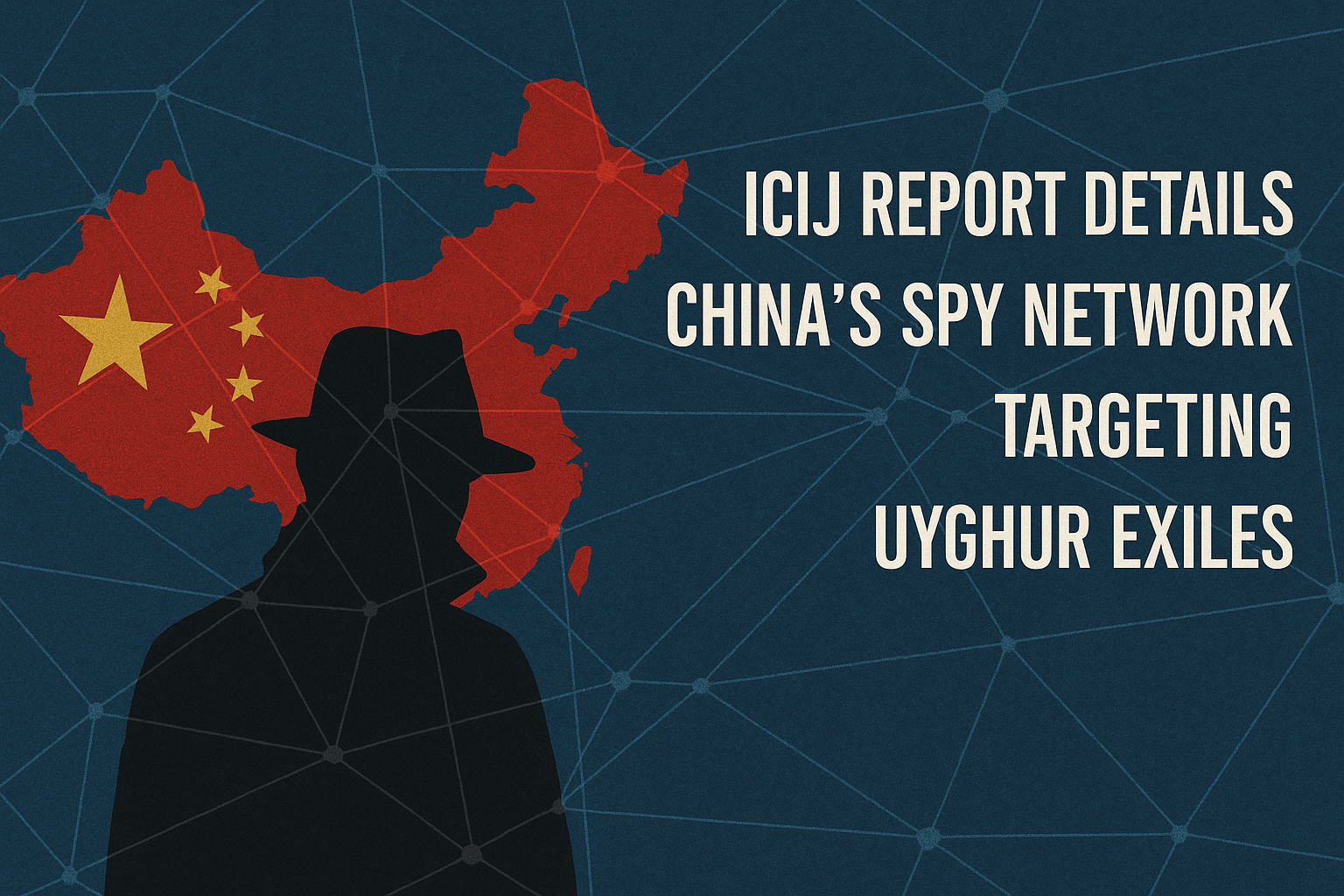By Uyghur News Desk
June 29, 2025
A sweeping new investigation by the International Consortium of Investigative Journalists, or ICIJ, reveals how China is extending its repression beyond its borders, using coercion and espionage to monitor, threaten and manipulate Uyghur exiles across the globe.
The investigation, titled China Targets, outlines how Chinese authorities have pressured vulnerable individuals — including former activists — to act as spies within Uyghur diaspora communities. The report raises urgent concerns about the safety and autonomy of Uyghur communities abroad, many of whom fled persecution only to find themselves targeted again.
Uyghurs Forced to Spy or Face Retaliation
One of the most alarming cases cited is that of Shadeke Maimaitiazezi (Memeteziz Sadiq ), a Uyghur father of five from Qargilik (Yecheng), who is now imprisoned in Türkiye for allegedly spying on fellow Uyghurs. Maimaitiazezi said Chinese security agents coerced him into surveillance work by threatening his family members still living in Xinjiang — a region where China has implemented mass detentions, forced labor, and religious restrictions targeting Uyghurs.
“They told him, ‘Work for us or we will destroy you and everyone you love,’” his lawyer said.
Turkish prosecutors said Maimaitiazezi received more than $100,000 from Chinese operatives to gather intelligence on Uyghur activists. He was sentenced to 12 years and six months in prison earlier this year. Human rights advocates argue he was a victim of Beijing’s coercive spy network — a man manipulated into betraying his own people under threat of state retaliation.
‘A Fire Burning Outside China’
The ICIJ report documents incidents in more than a dozen countries — including Sweden, Canada, Germany, Turkey and Switzerland — where Uyghur refugees or community leaders were approached by individuals suspected of working for Chinese intelligence.
Haiyuer Kuerban, an advocate with the World Uyghur Congress based in Berlin, called the operation “massive and strategic.”
“A fire is burning outside China,” Kuerban said, “and they are using every possible means to put it out.”
Civilian Covers and Diplomatic Gaps
Rather than relying solely on diplomats or formal intelligence officers, Chinese authorities are increasingly using civilians — including businesspeople, students and former activists — to infiltrate exile communities, according to the report. Many of these efforts are reportedly coordinated through the Chinese Communist Party’s United Front Work Department.
Two prominent cases highlighted in the report involve individuals known by aliases: Guo Jian, a former dissident in Germany, and Eric, a former activist-turned-spy who later defected to Australia. Both allegedly infiltrated democracy movements while secretly collecting information for Beijing.
Guo is accused of leaking more than 500 documents, including sensitive European Parliament material, to Chinese authorities. Eric admitted to using his activism as cover for intelligence gathering over a 15-year period. He told investigators his work was part of China’s broader strategy to dismantle opposition abroad.
Fear and Distrust Among Exiles
Within the Uyghur diaspora, the report has heightened fears that community events and advocacy gatherings are being used by informants to collect personal data and undermine solidarity.
“The Chinese government wants to know everything,” a Canada-based Uyghur activist told ICIJ. “If someone is collecting information, they join our conference and get the list of who’s who.”
ICIJ also reviewed internal Chinese security documents that outline formal public informant registration systems — long used in Xinjiang — now reportedly employed abroad.
Even those who resist pressure are not safe, according to the investigation. Chinese authorities have reportedly used online smear campaigns, threats against family members, and other forms of digital harassment to intimidate critics overseas.
Governments Lag Behind
Despite increasing evidence, many democratic governments have yet to develop the tools needed to counter transnational repression. Law enforcement responses are inconsistent, and victim support services are scarce.
“The European Union still lacks the tools to address interference by proxy actors operating under civilian cover,” said Hannah Neumann, a member of the European Parliament.
While G7 leaders recently condemned transnational repression in a joint statement, Uyghur advocates say symbolic gestures are not enough.
“Every day the world fails to act is another day we are terrorized in exile,” said one Uyghur community leader who requested anonymity.
A Call to Action
The China Targets report is being viewed by Uyghur advocacy groups as a wake-up call for democratic states. Many are calling for immediate reforms, including:
- Strengthening counterintelligence operations focused on Chinese state tactics.
- Establishing victim support services tailored to diaspora communities.
- Investigating suspected infiltration of civil society and refugee networks.
- Criminalizing coercion and intimidation by foreign governments on domestic soil.
For Uyghur families who fled mass repression, only to find themselves hunted once more, the path to safety remains uncertain. Advocates warn that the silence of the international community has allowed repression to grow sharper, and that Uyghur exiles — once safe abroad — now live under renewed threat.
